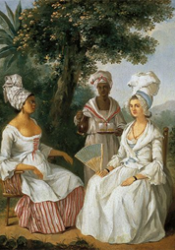An Examination of Racism and Gender in "The Woman of Colour: A Tale"
Olivia’s interactions with men vs. her interactions with women vary throughout the novel. However, when interacting with members of English society, she is consistently berated and/or put down.
This is most evident in her interactions with Mrs. Merton, which highlight the difference between women of colour and white women in English society. Much of waht the audience witnesses is Mrs. Mertons inherent need to compete with Olivia because she has been told throughout her life that she is "better" than women of colour. However, the reader gets to witness how Olivia is both much smarter and much more beautiful than Mrs. Merton, which is what attracts men like Mr. Honeywood. This exacerbates an interaction that is already rife with animosity between the two women because instead of partnering against the men, who regard both women with some distaste, Mrs. Merton constantly tries to put Olivia down. Through these examples, it is evident that racism pitted women against each other and further divided families during this period in English society.
For example: “A servant now interested with a large plate of boiled rice. Mrs. Merton half raised her head, saying--‘Set it there,’ pointing towards the part of the table where I sat. ‘What is this?’ asked Mr. Merton. ‘Oh, I thought that Miss Fairfield--I understood that people of your--I thought that you almost lived upon rice,’ said Mrs. Merton, ‘and so I ordered some to be got,--for my own part, I never tasted it in my life, I believe!’” (77).
“Mrs. Merton’s remarks on the gravity and the absence of Augustus, are made in my hearing, and in order to mortify and to wound me; but no remarks of hers can now have the power to add to the poignancy of my feelings” (91).
Interactions like this highlight how racism has taken over logic in English society. Instead of warning Olivia that Augustus is not what he seems, Mrs. Merton insults Olivia instead and revels in her emotional turmoil.
The betrayal of Augustus is also a telling moment for the reader to understand how racism and gender relate in English society at this time. Augustus revelas that he does not care about Olivia, and emotionally manipulates her throughout their relationship. He also lies to both himself and his friends about the situation. She is willing to call off their marriage when they first meet and pursues him to do so, but he manipulates her into thinking that he is in love with her. This causes Olivia to constantly second guess herself. Overall, his manipulation highlights how he sees people of colour as less than human. His disregard for her emotions is telling that men automatically saw women as lesser than them, but women of colour were treated especially heinously. Even Olivia's wit is not enough to help her against an apathetic man who does not care for anyone but himself.
At one point Augustus states, “Are you so insensible to your own numerous and unrivalled virtues and perfections? Heaven is my witness, that I am warmly, sincerely interested for your happiness!” (93).

